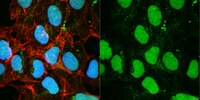A Family of Vertebrate-Specific Polycombs Encoded by the LCOR/LCORL Genes Balance PRC2 Subtype Activities.
Conway, E; Jerman, E; Healy, E; Ito, S; Holoch, D; Oliviero, G; Deevy, O; Glancy, E; Fitzpatrick, DJ; Mucha, M; Watson, A; Rice, AM; Chammas, P; Huang, C; Pratt-Kelly, I; Koseki, Y; Nakayama, M; Ishikura, T; Streubel, G; Wynne, K; Hokamp, K; McLysaght, A; Ciferri, C; Di Croce, L; Cagney, G; Margueron, R; Koseki, H; Bracken, AP
Mol Cell
70
408-421.e8
2018
Show Abstract
The polycomb repressive complex 2 (PRC2) consists of core subunits SUZ12, EED, RBBP4/7, and EZH1/2 and is responsible for mono-, di-, and tri-methylation of lysine 27 on histone H3. Whereas two distinct forms exist, PRC2.1 (containing one polycomb-like protein) and PRC2.2 (containing AEBP2 and JARID2), little is known about their differential functions. Here, we report the discovery of a family of vertebrate-specific PRC2.1 proteins, "PRC2 associated LCOR isoform 1" (PALI1) and PALI2, encoded by the LCOR and LCORL gene loci, respectively. PALI1 promotes PRC2 methyltransferase activity in vitro and in vivo and is essential for mouse development. Pali1 and Aebp2 define mutually exclusive, antagonistic PRC2 subtypes that exhibit divergent H3K27-tri-methylation activities. The balance of these PRC2.1/PRC2.2 activities is required for the appropriate regulation of polycomb target genes during differentiation. PALI1/2 potentially link polycombs with transcriptional co-repressors in the regulation of cellular identity during development and in cancer. | 29628311
 |

















